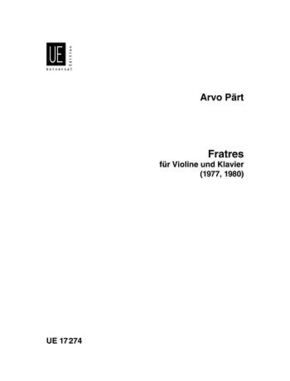| Verlag | Universal Edition |
| Auflage | 2000 |
| Seiten | 16 |
| Format | 22,0 x 29,0 x 0,3 cm |
| Noten | Partitur. | |
| Gewicht | 120 g |
| ISBN-10 | 3702414711 |
| ISBN-13 | 9783702414719 |
| Bestell-Nr | 70241471A |
Fratres in seiner ursprünglichen Besetzung für Violine und Klavier ist ein Auftragswerk der Salzburger Festspiele und wurde am 17. August 1980 ebendort uraufgeführt (Violine: Gidon Kremer, Klavier: Elena Kremer). Daniel Hope, internationaler Violinsolist, über die Ausgabe: "Fratres hat meine Ohren auf neuste Art und Weise geöffnet. Als ich das Stück kürzlich einspielte, war ich über die Ausgabe der Universal Edition überaus erfreut. Ein Meisterwerk braucht eine Darstellung, die klar und deutlich die Wünsche des Komponisten wiedergibt, so wie in diesem Werk." In Pärts eigenem "Tintinnabuli"-Stil komponiert, ermöglicht das Stück unterschiedliche Besetzungsversionen, da es nicht an eine konkrete Klangfarbe gebunden ist. "Für mich liegt der höchste Wert der Musik jenseits ihrer Klangfarbe. Ein besonderes Timbre der Instrumente ist ein Teil der Musik, aber nicht der Wichtigste. Das wäre meine Kapitulation vor dem Geheimnis der Musik. Musik muss durch sich selbst existieren ... zwei, dr ei Töne ... Das Geheimnis muss da sein, unabhängig von dem Instrument." (Arvo Pärt) Schwierigkeitsgrad: 2-4
Inhaltsverzeichnis:
Fratres für Violine und Klavier
Fratres (original setting for violin and piano) was commissioned by the Salzburg Festival and premiered on August 17th, 1980 at that very place (violin: Gidon Kremer, piano: Elena Kremer).
Daniel Hope, internationally acclaimed violin soloist, about the edition: 'Fratres opened up my ears in a completely new way. Recently when I recorded it, I was extremely pleased about the edition by Universal Edition. A masterpiece needs an illustration that clearly depicts the composer's wishes, as it was done with this piece.'
Composed in Pärt's very own 'Tintinnabuli'-style, this piece allows many different settings because it is not bound to a specific tone color. 'The highest virtue of music, for me, lies outside of its mere sound. The particular timbre of an instrument is part of the music, but it is not the most important element. If it were, I would be surrendering to the essence of the music. Music must exist of itself ... two, three notes ... the essence mu st be there, independent of the instruments.'
(Arvo Pärt)Instrumentation:for violin and piano

